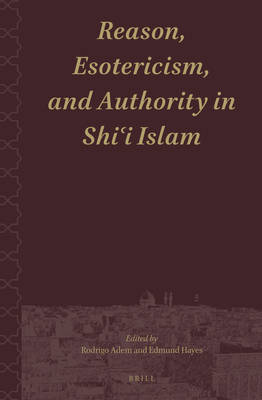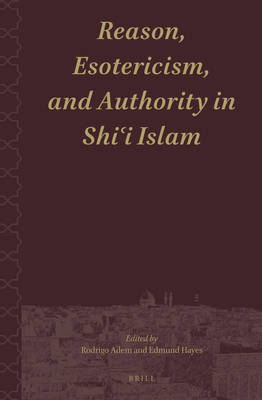
- Afhalen na 1 uur in een winkel met voorraad
- Gratis thuislevering in België vanaf € 30
- Ruim aanbod met 7 miljoen producten
- Afhalen na 1 uur in een winkel met voorraad
- Gratis thuislevering in België vanaf € 30
- Ruim aanbod met 7 miljoen producten
Zoeken
Reason, Esotericism, and Authority in Shiʿi Islam
€ 236,95
+ 473 punten
Omschrijving
This volume advances the critical study of exegetical, doctrinal, and political authority in Shiʿi Islam. Naive dichotomies of "reason" and "esotericism" in Islamic Studies have often marginalized Shiʿi thought or impeded its understanding. The studies presented here aim to foster more exacting frameworks for interpreting the diverse modes of rationality and esotericism in Twelver and Ismaili Shiʿism and the socio-epistemic values they represent within Muslim discourse.
The volume's contributions highlight the cross-sectarian genealogy of early Shiʿi esotericism; the rationale behind Fatimid Ismaili Quranic taʿwīl hermeneutics; the socio-political context of religious authority in nascent Twelver Shiʿism; authorial agency wielded by Imami hadith compilers; the position of esoteric Shiʿi traditions in Timurid-era Ḥilla; and Shiʿi-Sufi relations with Uṣūlī jurists in modern Iran.
Contributors: Rodrigo Adem, Alessandro Cancian, Edmund Hayes, Sajjad Rizvi, Tahera Qutbuddin, Paul Walker, George Warner
The volume's contributions highlight the cross-sectarian genealogy of early Shiʿi esotericism; the rationale behind Fatimid Ismaili Quranic taʿwīl hermeneutics; the socio-political context of religious authority in nascent Twelver Shiʿism; authorial agency wielded by Imami hadith compilers; the position of esoteric Shiʿi traditions in Timurid-era Ḥilla; and Shiʿi-Sufi relations with Uṣūlī jurists in modern Iran.
Contributors: Rodrigo Adem, Alessandro Cancian, Edmund Hayes, Sajjad Rizvi, Tahera Qutbuddin, Paul Walker, George Warner
Specificaties
Betrokkenen
- Uitgeverij:
Inhoud
- Aantal bladzijden:
- 276
- Taal:
- Engels
- Reeks:
- Reeksnummer:
- nr. 2
Eigenschappen
- Productcode (EAN):
- 9789004464391
- Verschijningsdatum:
- 19/08/2021
- Uitvoering:
- Hardcover
- Formaat:
- Genaaid
- Afmetingen:
- 158 mm x 238 mm
- Gewicht:
- 639 g

Alleen bij Standaard Boekhandel
+ 473 punten op je klantenkaart van Standaard Boekhandel
Beoordelingen
We publiceren alleen reviews die voldoen aan de voorwaarden voor reviews. Bekijk onze voorwaarden voor reviews.







